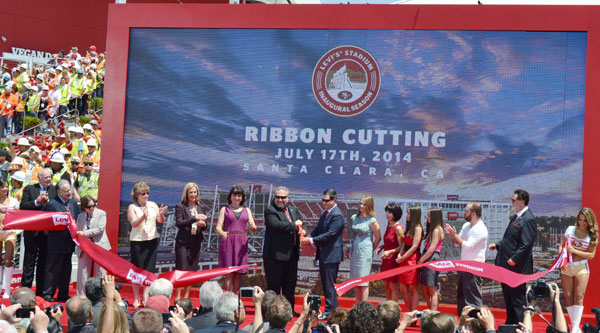After two years of closed-door hearings and discussion, a private arbitrator awarded the Santa Clara Stadium Authority a 1.07 percent increase in the Levi’s Stadium facilities rent — raising the annual amount to $24,762,000 from $24,500,000, a total of $10.5 million over the 40-year term of the stadium lease.
The Stadium Authority will also receive reimbursement of its court and legal costs — which are likely to be considerably more than the $262,000 annual increase — as well as a two years’ retroactive adjustment.
During a 2015-16 contractually mandated rent reset negotiation, the 49ers Stadium Company contended that based on the terms of the lease the facilities rent should be lowered. The Council had discussions with the 49ers* but when no agreement could be reached the 49ers took the dispute to arbitration.
The “$180 million win” that the City has been touting is deceptive. The City is double-counting the $4.5 million facilities rent reduction that the 49ers asked for during 2016. The City never agreed to the reduction.
Since then the 49ers have continued to pay $24.5 million, and will continue to pay that amount for the next 40 years, the Stadium Authority already had that $180 million in its forecast. It’s not additional money that the Authority is going to get.
The Council, however, asserts that a possible loss averted can be counted as a gain.
“If we had lost that much money every year we would not have money to pay into the reserves such as maintenance, capital improvement and demolition reserves,” explained Council Member Teresa O’Neill, speaking for the City in the absence of the Mayor and City Manager during what was billed as the Mayor’s “press availability.”
Regardless of the arithmetic, none of the facility rent increase or reimbursements go to the City of Santa Clara’s general fund, per the terms of the 2012 contracts. The facility rent is one of three elements of the total stadium rent and is used solely for financing stadium expenses: debt, expenses and reserves.**
“We’re taking money from stadium reserves to pay public safety costs,” O’Neill said. The first priority “is our ability to fund reserve accounts. We have to take care of these things before [thinking about] putting money in the general fund.”
O’Neill is referring to the 2012 stadium management contracts, which set a $1.9 million cap on reimbursement for public safety costs for the season’s NFL events. Any costs above that threshold are paid from the Stadium Authority’s discretionary fund. Public safety costs for non-NFL events are fully reimbursed from event revenues.
The ruling as well as the financial information backing it, is secret by the terms of the arbitration clause of the lease agreement.
However, the Mayor is calling for disclosure of the Statement of Decision, saying in an Aug. 13 letter to 49ers President Al Guido that the “best interests of the residents and full transparency are my highest priorities.”
“It will have to go to a vote of the Council at the Aug. 21 meeting,” said O’Neill. Until then, she said, “I can’t speak to actual numbers.”
The document was leaked to the Mercury News Tuesday afternoon.
“We accept the arbitrator’s decision to increase our annual rent payment by one percent,” said 49ers VP of public affairs and strategic communications Rahul Chandhok, calling the Mayor’s accusation that the 49ers had “a history of withholding documents and payments” another chapter in her history of “deceitfulness” in her dealings with the NFL team.
There are still two outstanding 49ers lawsuits; one alleging that the City overcharged the 49ers by a total of $1.7 million for golf course parking, and the second charging Gillmor and the Stadium Authority Board with acting in bad faith and trying to break the stadium management contract.
City’s Financial Model Underlies Dispute
In 2016 the 49ers Stadium Company asked to renegotiate the facilities as their contract stipulated and proposed reducing it to $20 million.
The 2012 lease set the facilities rent at $24.5 million for the stadium’s first full year of operation — itself a made-up number based on a cost model created by Santa Clara’s consultant, Keyser Marsden (KM), which considers the algorithms and underlying assumptions proprietary and wouldn’t make them public.
The lease stipulates that after a full year of operations, if debt, interest or operating expenses change, the facility rent was to likewise change. The rent would then be set there for the remaining term of the lease. “Facility Rent is projected to be reduced over time,” said the initial 2012 lease agreement.
Based on Levi’s Stadium’s performance that’s not an unreasonable assumption.
Stadium construction was $136 million less than forecast, while seat license revenue was $140 million over forecast. Seat license proceeds continue to surpass budget, and interest expense is significantly under the 2012 forecast — as is the outstanding debt of $382.7 million. Revenue has been slightly higher than budget, while expenses have been right on budget.
When the dispute first erupted in 2016, O’Neill objected to the opacity of KM’s model and asked for the underlying numbers, which were not forthcoming. However, unlike the Mayor, she wasn’t on the Council when agreements were approved and thus was unable to review proprietary information in closed session.
*The City refused to disclose information about these meetings and communications between City officials and the 49ers, justifying withholding this information under “Government Code section 6254(k) and Evidence Code sections 950 et seq.”
**The City’s general fund receives from Levi’s Stadium ground and performance rent —which is 50 percent of net profit from non-NFL events and has been between $3 and $5 million annually.







